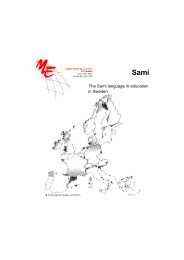Multilingual Early Language Transmission (MELT) - Mercator ...
Multilingual Early Language Transmission (MELT) - Mercator ...
Multilingual Early Language Transmission (MELT) - Mercator ...
You also want an ePaper? Increase the reach of your titles
YUMPU automatically turns print PDFs into web optimized ePapers that Google loves.
Curriculum and Training for Irish Medium Preschooling<br />
Curriculum<br />
Preschool provision for children under age 6 has undergone major review and regulation in<br />
Ireland in the last twenty years (Child Care Act 1991), and the naíonraí, like other part-time<br />
services must meet the regulations governing part-time early years’ education which are<br />
formulated, monitored and implemented by the Department of Children and Youth Affairs.<br />
The most recent innovation is the development of a national curriculum for all children from<br />
birth to six years. This curriculum entitled Aistear: the <strong>Early</strong> Childhood Curriculum Framework<br />
(National Council for Curriculum and Assessment, 2009) is designed to be used in the range<br />
of early childhood settings including children's own homes, with private childminders, in full<br />
and part-time day-care settings, and sessional services, including Irish-medium preschools,<br />
as well as the infant classes catering for 4-6 year olds in primary schools. The Aistear<br />
curriculum highlights the critical role of play, relationships and language for young children's<br />
learning, and aims to promote strong foundations and seamless progression from home,<br />
crèche or preschool to school, through implicit and explicit links to the Revised Primary<br />
School Curriculum (Government of Ireland, 1999). The values of the Aistear curriculum<br />
framework are much in accordance with the values and priorities of the naíonraí, (whose<br />
organisation and representatives contributed to consultations on its development) in<br />
emphasising the importance of play and language in particular, and it is clearly intended to<br />
be implemented in Irish-medium groups as well as English-medium ones, since its<br />
documentation includes examples, activities and suggestions for Irish-medium groups (see<br />
also Ní Rianaigh, 2011). However, it will be some time before equivalent resources suitable<br />
for Irish-medium groups are available and before its implementation in this sector can be<br />
evaluated to ensure compatibility with the specific challenges of early immersion.<br />
Nevertheless, Aistear represents the beginning of an exciting phase in early years’ education<br />
in Ireland in general, as well as for Irish-medium groups in particular.<br />
Training for <strong>Early</strong> Years Provision in Ireland<br />
Offering immersion preschooling in a minority language requires the development of<br />
appropriate teacher training, as well as curricula and work organisations. Edelenbos,<br />
Johnstone and Kubanek (2006) carried out a review of effective pedagogical practice in<br />
teaching foreign languages to young learners (also relevant to different models of early<br />
bilingual education). They identified as a central factor which contributes to successful<br />
language learning the provision of well-trained, resourced and supported teachers with<br />
expertise in the target language and in language pedagogy. There have, in the past, been<br />
efforts to encourage the achievement of childcare and early education qualifications among<br />
those working in preschools in Ireland, but the recent innovation (2010) of a national<br />
initiative offering a free preschool year to all children aged 3-4 in a recognised provider of<br />
<strong>Early</strong> Childhood Care and Education (ECCE), including naíonraí, has led to the enforcement of<br />
certain training requirements. To qualify as preschool providers in this programme, all preschool<br />
Leaders are required to hold a qualification from the Further Education and Training<br />
Awards Council (FETAC, the statutory awarding body for further education and training in<br />
103



